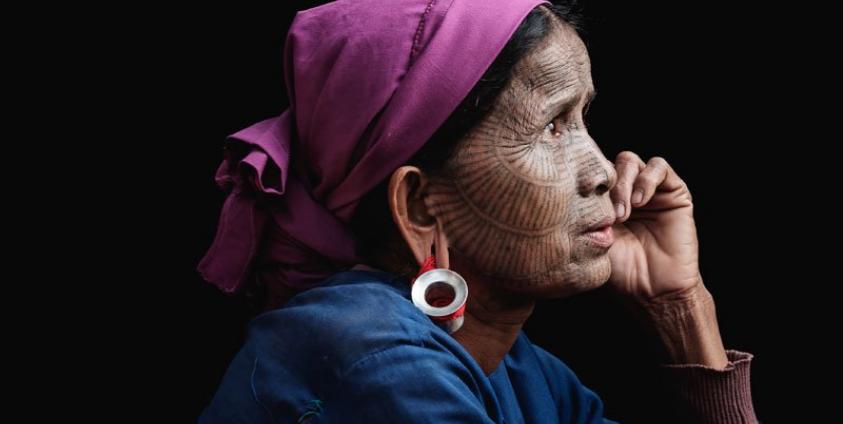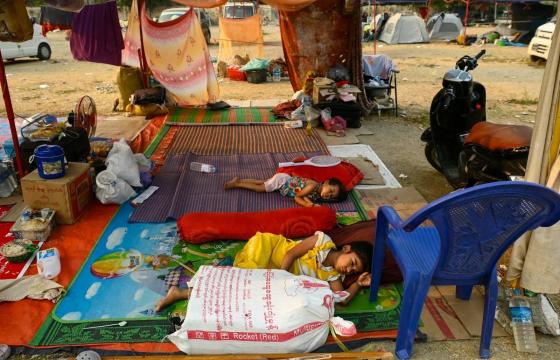In a traditional Chin family, either the oldest or youngest son receives the hereditament when the father passes away. If there is no son, the family will look for male relatives in the clan. Daughters can inherit - if and only if the family cannot find any suitable men, according to a research paper launched last month by a Myanmar women’s group called Ninu, also known as the Women in Action Group.
Though the well-known culture of tattooing their faces may be fading gradually for Chin women, who reside mostly in Chin State in western Myanmar, the patriarchal customs are still chained to the clan system, the laws deeply engraved in the hearts of many Chin people. Because of that, the female victims of violence and rape are silenced.
According to the research, old traditions remain entrenched, traditions that can have a negative effect on women and girls. As a 62-year-old retired village headman said, “My daughter was raped by a man from another village. I informed the police and tried to take the case to court.” He said could not forgive the offender when his family asked for forgiveness. The police then advised him to solve it according to Chin customs. Yet, he refused and wanted to bring the case to the district level.
“But later my older brother interfered, telling me that I should accept their apology as this was our custom. At last, I gave up and accepted their compensation of ten thousand kyat.”
Ten thousand Myanmar kyats – the equivalent of slightly more than $7, the cost of a Chin woman’s dignity.
This case and others prompted Mai Len Nei Cer, a Chin woman herself, together with six women field researchers from Ninu, to conduct research into the social injustices encountered by Chin women in the course of half a year covering 19 tribes in nine townships in Chin State, involving 126 male and 167 female participants aged between 16 and 89.
Their names of the participants are not included in the report. “We keep their names and village names secret in order to protect their privacy. We promised them to do so, so that they would be able to speak freely,” said Mai Len Nei Cer.
This research is also a reaction to the Chin Special Division Act, a law that was enacted in 1948. Article 15 (a) especially deals with the customs of Chin people.
The inheritance practices and the division of property are stated clearly in the Chin Special Division Act. Ninu has been fighting for open discussion about amending the act for three years and is currently waiting for a reply from the Chin State Hluttaw, the house of representatives.
The law also suggests that if a wife dies first, all will be owned by the husband. Yet, if a husband dies first, the properties have to be divided among sons, daughters and the widow. Daughters will get half of their brother’s share, the mother will only get half of her daughter’s.
“We need to understand both the written Chin Act and unwritten customary practices in order to find ways to advocate for positive change,” said Mai Len Nei Cer.
Among Chin people, the objectification of women is deep-rooted. When a man proposes to a woman, the bride’s family will demand a bride price. There are different words to refer to bride price but most of the words mean ‘price’, as it is a buying and selling business.
This disparaging perception towards Chin women also appears in a lot of the traditional sayings. An example would be “a drum and wives are there to be beaten” as referenced by Ninu’s research, identifying wives as objects to be casually hit.
Traditions are seldom challenged. Today, Chin men still believe women are their property, especially with the bride price system. According to Ninu’s research, a 35-year-old woman from Paletwa Township called to mind incidents of couples quarrelling and said, “A husband would say to his wife: I have paid that much for you, so you have to work hard [for me]!”
If a woman initiates a divorce, her parents and relatives must return the bride price they received at the time of the marriage. But if they are not willing or cannot afford to repay, women cannot divorce their husbands. In the midst of all these discussions and procedures, however, women have no say - all decisions are made by her parents and relatives. They are not allowed to decide on their own divorce.
A 57-year-old widow from Hakha Township recalled her cousin’s experience of being in an arranged marriage when she was young. “As she couldn’t love her husband, they had problems every night. Around 10 or 11 pm, my father was often summoned to their house to talk to her. She wanted a divorce, but her parents said they wouldn’t be able to return the bride price. So she had to endure. After having five children, she still couldn’t love her husband and ran away to Phakant.”
From the imbalanced decision-making on the discussion table between clans to the unequal treatment at home around the dinner table, women are often either subdued, or neglected. Husbands are more noteworthy than wives; and sons are more preferred than daughters.
In Chin culture, sons are the hosts. They are the people who sustain the clan from generation to generation. However, daughters are simply guests. As they are expected to get married and soon they will belong to other clans.
According to the research, many married women live in a constant fear that their husbands will marry another wife, or divorce them if they cannot bear a son.
Most women do not get the education and resources that they desire, too, according to the research. “My father sent my brothers to study abroad. But when I requested him to let me attend training in Yangon, he said he did not want me to have a hard life outside. After I requested him again and again, he got angry and told me that a woman’s place is at home,” said a 24-year-old woman from Matupi Township.
Not all women, though having a place at home, feel safe. When domestic violence happens in Chin households, when men beat their wives - alcohol is blamed. Apart from that, according to the research, some Chin people believe women deserve to be beaten if they talk back and complain. Just like the old saying, Chin women are no different than drums.
When rapes happen in the community, elderly male relatives of the perpetrator will go to the survivor’s family to apologize. In most cases, their apology would be accepted. Yet, all decision makers are men and the survivors are not consulted. Women, once again, are hurt, and left voiceless.
Mai Len Nei Cer says there are two main stumbling blocks for women’s access to justice, according to the research.
Firstly, there is the exclusion of women from all the decision-making processes. From getting married to filing a divorce, from being beaten to raped - they don’t have any authority over their life decisions.
Secondly, the hindrance is the Chin Special Division Act that separates them from the outside laws and circumscribes their issues at the community level. Though the customary law is already the most accessible law to Chin women, it is also one of the biggest impediments to justice them – as it restrains them to accept Chin traditions, including the unfair treatment.
“We still have a lot to do, a lot of advocacy work to empower women. It is a very difficult task and may take very long. But if we push a little bit by bit, there will be changes,” said Mai Len Nei Cer.
Along with her team at Ninu, Mei Lam Nei Cer is currently travelling around Myanmar offer the findings of her group’s research. She aspires to educate people and let them know that Chin women have had enough of being objectified, abused and belittled.








